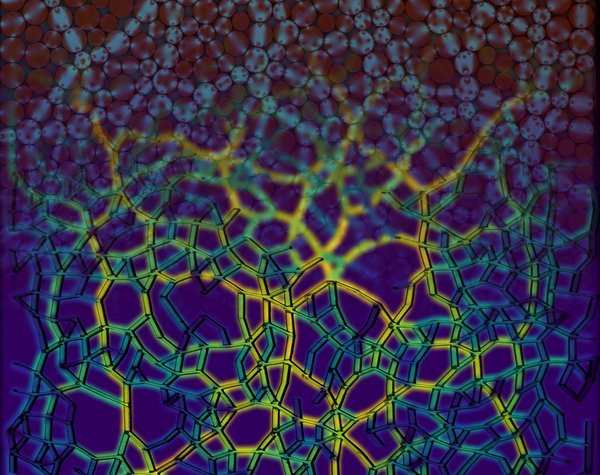Danielle S. Bassett
(University of Pennsylvania, Philadelphia, USA)
Karen E. Daniels
(NC State University, Raleigh, USA)
Mason A. Porter
(University of California, Los Angeles, USA)

The study of granular and other particulate networks is one of the most prominent areas of condensed-matter physics. However, progress is stymied by sparse interactions between individuals trained in the disparate network-based approaches that are relevant for granular media (from subjects such as statistical mechanics, network clustering, multilayer networks, algebraic topology, and more) and those that are trained in materials physics. From new trainees to seasoned investigators, individuals seeking to contribute to this field are required to find and parse a diverse and scattered literature from day one. The goal of our focus workshop is to close this gap.
Why use network science? The arrangements of particles and forces in granular materials and particulate matter have a complex organization on multiple spatial scales that range from local structures to mesoscale and system-wide ones. This multiscale organization can affect how a material responds or reconfigures when exposed to external perturbations or loading. The theoretical study of particle-level, force-chain, domain, and bulk properties requires the development and application of appropriate mathematical, statistical, physical, and computational frameworks. Traditionally, granular materials have been investigated using particulate or continuum models, each of which tends to be implicitly agnostic to multiscale organization. Recently, tools from network science have emerged as powerful approaches for probing and characterizing heterogeneous architectures in complex systems, and a diverse set of methods have yielded fascinating insights into granular materials.
Network science offers methods for quantitatively probing and analyzing large, interacting systems whose associated networks have heterogeneous patterns that defy explanations using regular or lattice-like interactions. Because granular materials have heterogeneities on many length and time scales, it is challenging to model their material properties and responses. The ability of network science to provide both qualitative and quantitative descriptions of the organization and dynamics of granular materials is very promising.
Our purpose is to bring together physicists, mathematicians, and materials scientists who study these problems. The workshop will open with presentations from experimentalists presenting data collected using the newest techniques available in the field. We will then catalyze new uses of these data with talks from experts in the theory of networks, the development of tools to characterize networks, the application of network tools to studies of granular materials, and the development of physically-informed network-based models and statistical techniques to granular media. We will place particular emphasis on how networks can be used to quantify heterogeneous organization in granular materials and to understand how these systems evolve when exposed to external perturbations. We seek a crystallization of particularly fundamental open questions and hope that participants will leave inspired to explore the applications of new techniques to new problems.
Carl Dettmann (UK)
Wiebke Drenckhan (France)
Michael Engel (Germany)
Silke Henkes (UK)
Eleni Katifori (USA)
Abigail Klopper (UK)
Jonathan Kollmer (Germany)
Erin Koos (Belgium)
Jürgen Kurths (Germany)
Andrea Liu (USA)
Xiaoming Mao (USA)
Ling Miao (USA)
Konstantin Mischaikow (USA)
Katie Newhall (USA)
Giovanni Petri (Italy)
Srikanth Sastry (India)
Matthias Schröter (Germany)
Ashley Smart (USA)
Marc Timme (Germany)
Antoinette Tordesillas (Australia)
